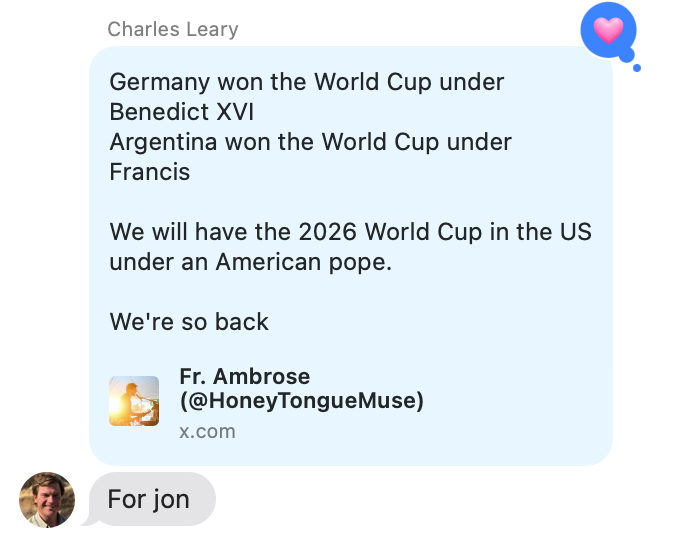A few text messages about Pope Leo XIV
Friends,
In the final weeks of the school year—and the final week before taking two trips to the American Southwest—I do not have as much time as I would like to process all that it means for Cardinal Robert Prevost to become Pope Leo XIV.
But I do have time to copy/paste, lightly edit, and categorize a series of text messages I sent in the past eighteen hours about these things!
Enjoy.
The Pope is an American
Wow. I wrote in my last newsletter that the best answer to the question Who will be the next Pope? is “If history is any indication: we have no idea.” Along with just about everyone else, I ruled out entirely any American Cardinal.
Interesting note: I was in the car following the introduction of Pope Leo XIV, and so I scanned AM radio until I found someone talking about these things. A listener called in to share that she was disappointed that the new Pope did not share any part of his address in English, as she would have expected from an American Pope. (I am sure he will speak plenty of English during his papacy, but he did not in his opening remarks.)
He, instead, spoke in Italian, Spanish, and Latin. Addressing St. Peter’s square in these two languages was both entirely appropriate to the moment and gives us insight into what he has been doing since he was born in Chicago. He spoke in Italian first because he the Pope is the Bishop of Rome, and Rome is in Italy. And he spoke in Spanish because nearly his entire ordained ministry was in South America.
The Pope’s Order & Personality
Many Deacons, Priests, and Bishops belong to religious orders: groups of people who all agree (vow) to live under a specific rule of life, and who often pursue similar callings. You are likely already familiar with the Benedictines, Jesuits, and Dominicans, for example.
Pope Francis was a Jesuit, and Jesuits are known—whether they deserve it or not—for being on the more progressive edge of the Roman Catholic tradition. (Which is still conservative compared to modern standards.) Jesuits tend to be very active in the world (running schools, serving the poor, etc.), especially among the marginalized.
Leo XIV, on the other hand, is an Augustinian. Those in that order tend to focus more on theological depth, the pursuit of truth through learning, and beauty. Theirs is a more scholarly and contemplative calling.
Leo XIV also seems to be quite a bit more reserved than his predecessor. It is worth noting that some of what people disliked about Francis did not necessarily stem from his official work, words, proclamations, etc., but rather his more off-the-cuff answers to questions on airplanes. I don't see Leo XIV doing that as much, if at all.
On Synodality and a Clear Direction from the Cardinals
As you have likely heard, one of the major priorities of Pope Francis was to move (return?) the Roman Catholic Church to a more synodical model of leadership and discernment. Synodality is a concept that emphasizes the importance of clergy and laity working together in communion to discern and make decisions about the life and mission of the Church.
Not everyone in the Roman Catholic Church is as excited about synodality as Francis was, but the fact that Leo XIV—who was close to Francis—was chosen as the next Pope appears to indicate that at least a majority of the Cardinals want that work to continue.
Humor: Funny things Sent or Received
What is the over/under on how many hours before Trump takes credit for an American Pope?
When will Lee Greenwood’s I’m Proud to be an American be translated into Latin and set to Gregorian chant?
And finally, a message I received in which I “felt seen”, as the kids and womenfolk are saying these days:
